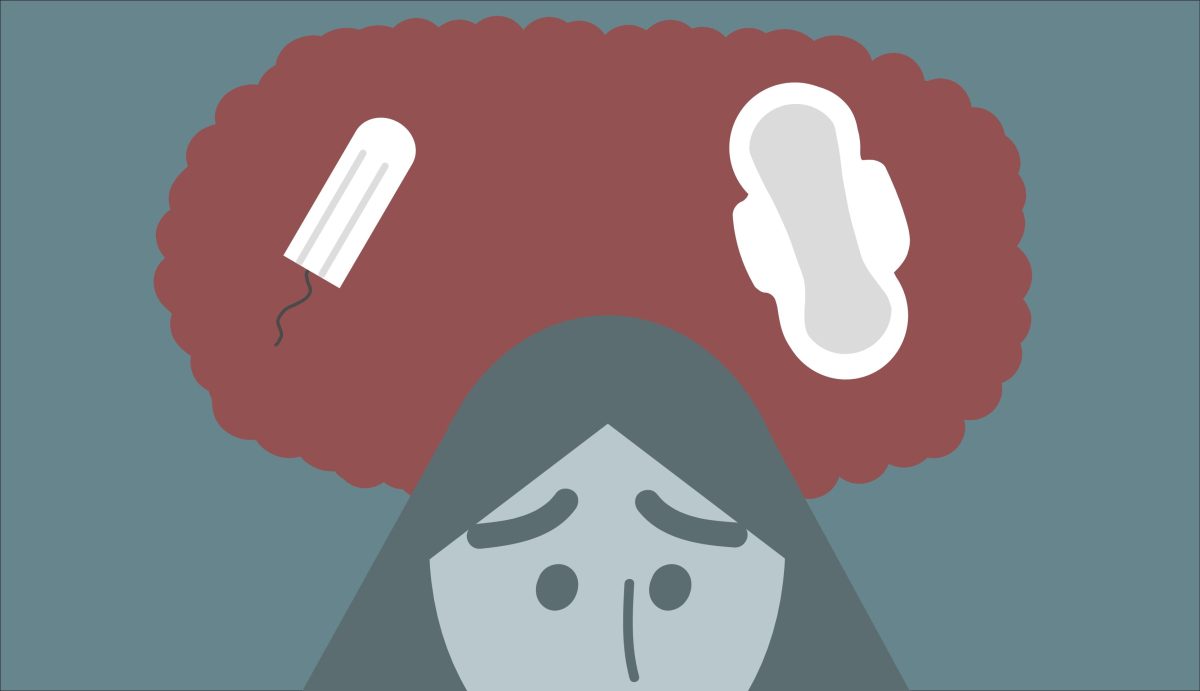My least favorite response to hear from men when a woman is upset is, “Are you on your period?”
You know what? Maybe it is because I’m on my period, and that’s perfectly reasonable. Do men even know why we’re so upset?
We have to deal with bloating, cramping, headaches, dizziness and a million other painful things happening in our body. Instead of making us feel bad for being on our period, men should try to sympathize. If they’re going to make comments about our periods, they should at least be educated on them.
To state the obvious: periods are a natural process. It’s biology. It’s a topic that should obviously be included when teaching how the human body works. Sadly, it’s not. According to the 2021 State of the Period report, 76% of students surveyed said they are taught more about the biology of frogs than the human female body in school.
This is due to a pervasive stigma around periods. There is a negative connotation surrounding periods, simply because so many people are ill-educated about them.
In fact, 65% of students surveyed agreed that “society teaches people to be ashamed of periods,” according to the State of the Periods report. We can see it when we try to censor the word “period” with words such as “Aunt Flo” or “that time of the month.” It actually makes periods sound less scientific and makes it feel dirtier than before.
Many men think menstruation is gross or unclean and don’t want to discuss it. If we teach periods in school, and truly educate people on all of the symptoms that come with them, they’d know better than to shame us.
The response to “I’m on my period” shouldn’t be, “Ew, I didn’t need to know that.” Instead it should be, “What can I do to make it easier?”
Opening up the conversation can lead to so many great things, such as discussions about cleanliness and safety.
It’s also helpful to educate people about periods for hygienic reasons. Being educated to take care of your own body can help prevent infections and reduce odors. It’s important that we prevent serious conditions like Toxic Shock Syndrome, which is life-threatening and can be caused by using a pad or a tampon for too long.
There’s also a common misconception that periods and menstrual cycles are the same and the words can be used interchangeably. They’re actually very different. A period is just one phase of the menstrual cycle.
Normalizing conversations about periods can also help people with their health. There are many menstrual disorders, such as fibroids and endometriosis. Some of these disorders can even cause difficulties with pregnancy. If people are educated on the symptoms of disorders and diseases, they can identify whether or not something could be wrong with them.
So how can we help destigmatize periods?
We should be talking about biology in biology class. It should be mandatory to have a discussion on the menstrual cycle during the reproductive health unit since they go together. There should also be discussions of reproductive health during health classes.
Young people usually get their period between the ages of 11 and 14, so it’s better to start the conversation sooner than later. Having open discussions helps normalize the topic, making the period conversation less taboo.
Talking about periods with normality will create comfort around the topic, and thus decrease fear of discussing important issues including symptoms of potentially harmful disorders. It also increases self-esteem when young people don’t have to feel ashamed or even gross for being on their period.
It’s incredibly important that we educate people — no matter their gender — about periods and the menstrual cycle. We should especially teach younger kids and teenagers about preventing infections and disorders because it will protect them in the long run.
We need to stop the stigma surrounding periods. They are not gross, they are just a natural bodily occurrence. Period.
















Lind Boss • Nov 7, 2023 at 7:46 pm
Very well written with good information and insight.
Thank-you.
Brenda • Nov 5, 2023 at 3:01 pm
Great article, Lilly! Well done!